By Senior Colonel Tan Kefei, Deputy Director General of the Information Office of the Ministry of National Defense (MND) and Spokesperson for the MND
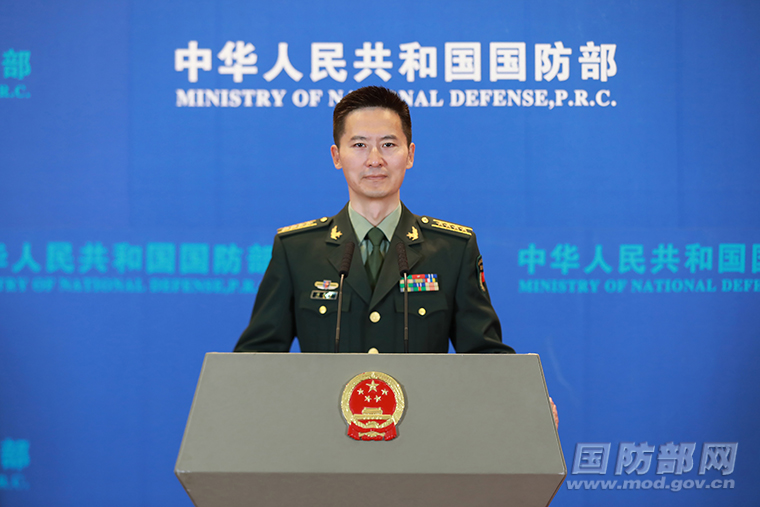
Senior Colonel Tan Kefei, spokesperson for the Ministry of National Defense (MND) of the People's Republic of China (PRC), answers reporters' questions at a regular press conference on April 28, 2022.(Photo:mod.gov.cn)
(The following English text of the press conference is for reference. In case of any divergence of interpretation, the Chinese text shall prevail.)
I have a piece of news at the top.
The ASEAN Regional Forum Defense Officials' Dialogue (ARF DOD) will be held on April 29 viavideo conference. China will co-chair the meeting with Cambodia, the rotating chair of ASEAN for 2022. With the theme of "Enhancing Solidarity and Cooperation to Achieve Harmony and Security", the meeting will discusss two main topics: "the Role of Defense Establishments in Support of COVID-19 Recovery" and "Strengthening Defense Practical Cooperation in the Post COVID-19 Era". Around 50 representatives from 27 ARF members will be invited to attend the meeting.
Question: This year marks the 73rd anniversary of the People's Liberation Army (PLA) Navy. The PLA Navy(PLAN) was born for the sea and is striving to be a strong naval power. Today, it has become an important force for safeguarding national sovereignty, security and development interests, and world peace, stability and prosperity. Please share with us the development of the PLAN since the 18th National Congress of the Communist Party of China (CPC).
Answer: As you have mentioned, this year marks the 73rd anniversary of the PLAN. Warm wishes to all our navy personnel. Since the 18th CPC National Congress, the PLAN has resolutely implemented the decisions and instructions of the CPC Central Committee, the Central Military Commission and President Xi Jinping, and thoroughly studied and implemented Xi Jinping Thought on Strengthening the Military. It has made historic changes and achievements in all aspects of its development.
First, political work has been strengthened. The PLAN has applied innovative theories of the CPC to educate and build the minds of its members. It has carried out themed education activities and the campaign on studying Party history and made efforts to cultivate and promote new-era navy role models to carry forward the glorious revolutionary traditions of the People's Navy. These efforts have effectively fostered the PLAN's spirit of being loyal in mission, brave in operation, and excel in ocean.
Second, preparedness and combat capabilities have been improved. By focusing on real combat training, naval troops have worked hard to build and improve the new-type military training system and enhance realistic training. The PLAN is speeding up the transition of its tasks from defense on the near seas to protection missions on the far seas, and improving its capabilities for strategic deterrence and counterattack, maritime maneuver operations, maritime joint operations, comprehensive defense, and integrated support.
Third, breakthroughs have been made in naval transformation. The building of new combat forces has improved in quality and speed. There are more new-type talent represented by carrier-borne aircraft pilots and aircraft carrier commanders. A modern equipment system with the fourth-generation equipment taking the lead and the third-generation equipment as the mainstay is taking shape. The integrated support chain based on overseas support base and maritime medical rescue platforms has become more efficient and achieved leapfrog development.
Fourth, military exchanges with foreign countries have become closer. The PLAN is committed to building a community with a shared future for mankind and a maritime community with a shared future. It has sailed around the world and made more and more friends. The PLAN has deepened high-level engagement, professional exchanges and technology cooperation with other navies and provided more international public security goods to the world. It is regularly engaged in bilateral and multilateral maritime exercises between China and Russia, China and Pakistan, China and Thailand, and China and Southeast Asian countries, as well as the International Military Games. Its vessel protection mission in the Gulf of Aden and the "Mission Harmony", which provides medical service, have been widely applauded. Its participation in salvaging the wrecked Indonesian submarine, and delivering relief supplies to Tonga has been appreciated by regional countries. A stronger PLAN will make new contributions to world peace, stability and prosperity.
PLA Navy's first aircraft carrier-themed promotional video "Dark Blue Waters" (English Edition).
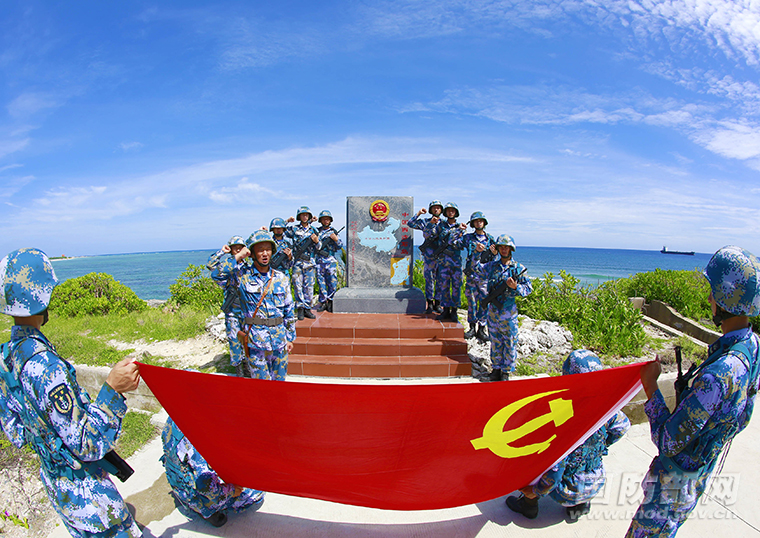
Sailors of PLAN maritime garrison command on the Xisha Islands take an oath to the Party flag in front of a sovereignty monument. (Photo by Zhao Xianghu)
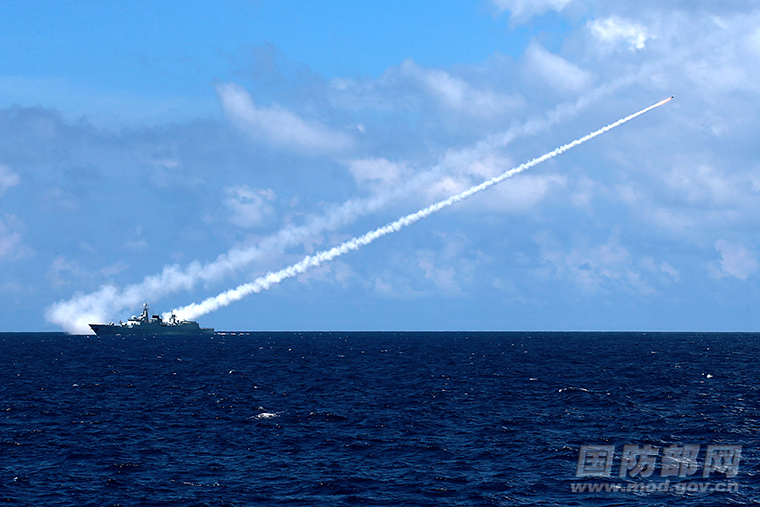
A ship-to-air missile is launched from the guided-missile destroyer PLANS Guangzhou. (Photo by Pu Haiyang)
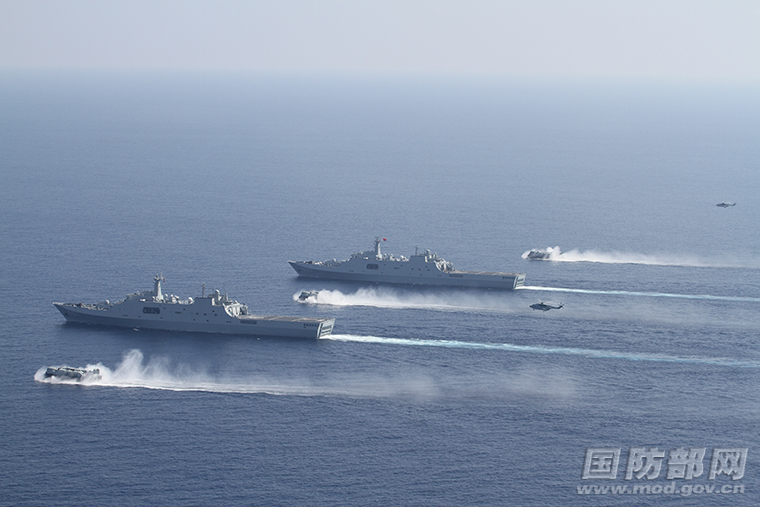
The amphibious dock landing ships PLANS Kunlunshan and PLANS Jinggangshan conduct realistic training. (Photo by Gan Jun)
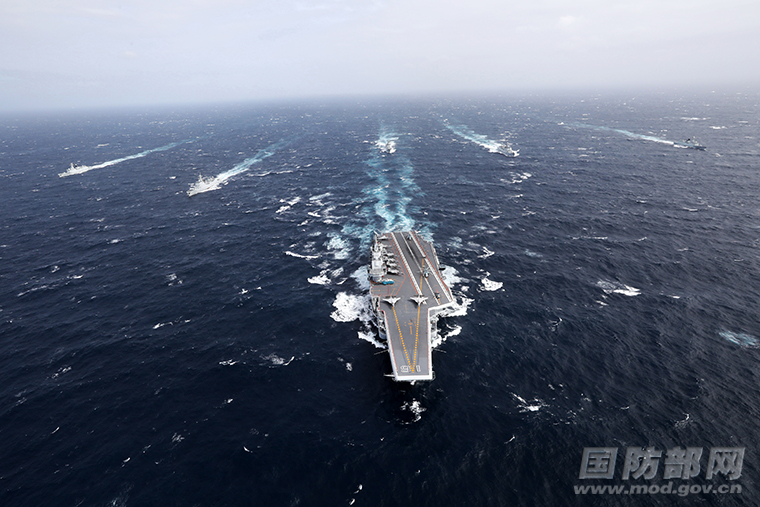
The PLANS Liaoning Carrier Task Group sets sail for the South China Sea to conduct trans-theater training. (Photo by Zhang Kai)
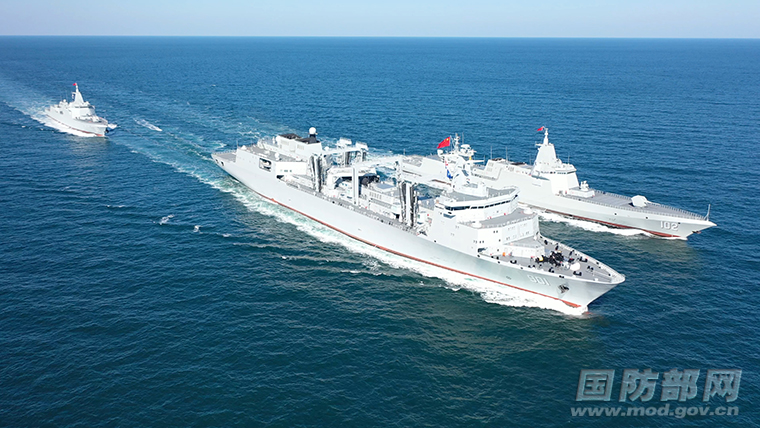
The new-type guided-missile destroyer PLANS Lhasa and comprehensive supply ship PLANS Hulunhu conduct a training exercise. (Photo by Xu Taotao)
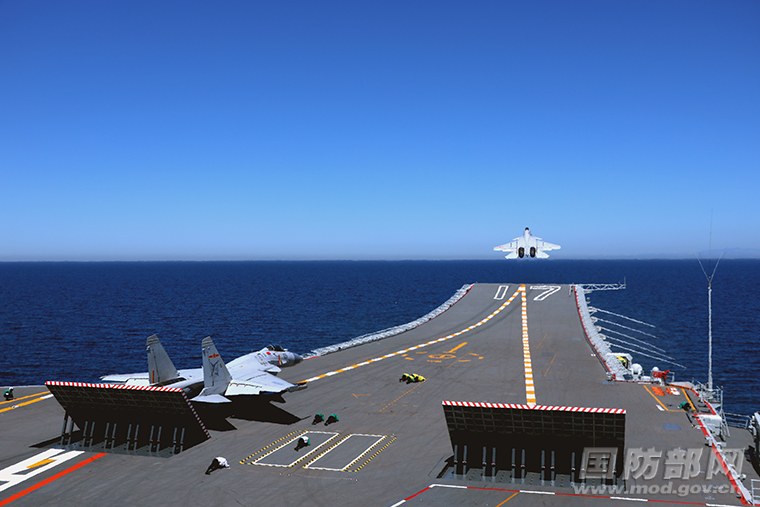
J-15 carrier-based fighter jets aboard the PLANS Shandong conducts flight training. (Photo by Li Gang)
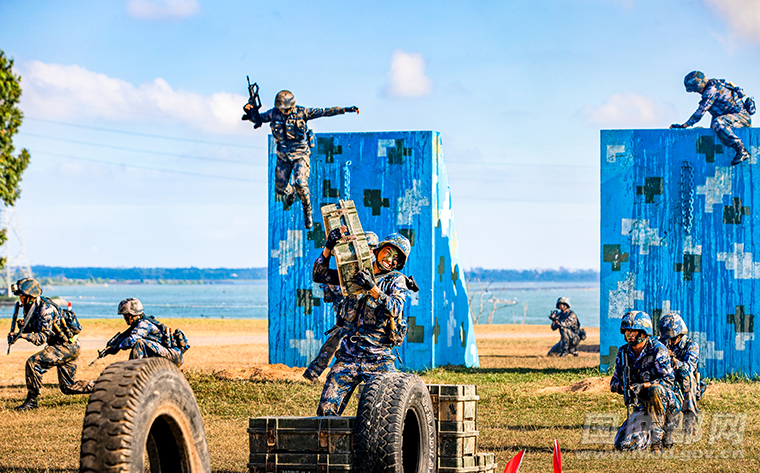
Members of PLAN Marine Corps conduct extreme combat fitness exercise. (Photo by Wang Wei)

A Philippine couple expresses their gratitude to the medical team assigned to the PLAN hospital ship Ark Peace for delivering their baby. (Photo by Wang Tiegang)
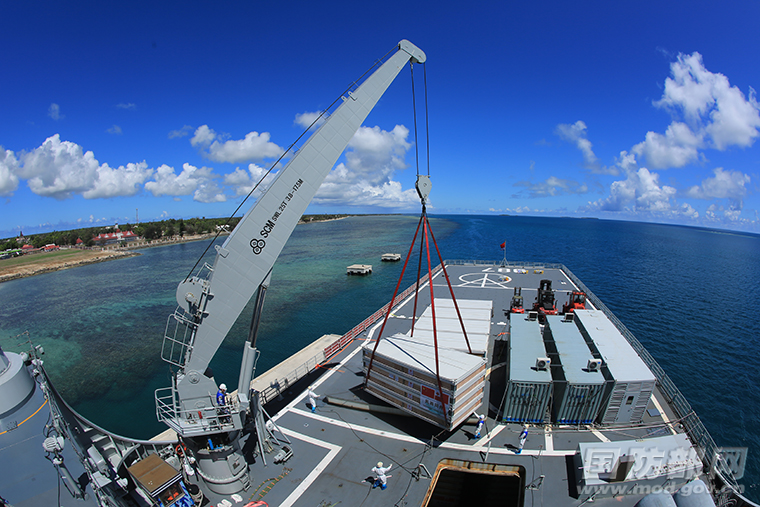
The amphibious dock landing ship PLANS Wuzhishan and comprehensive supply ship PLANS Chaganhu sail for Tonga to deliver relief supplies. (Photo by Xue Chengqing)
Question: It's reported that prosecutors in Hangzhou, Zhejiang Province, have recently filed a civil public interest lawsuit against a netizen named Chen who made inappropriate remarks that defamed martyrs defending the country’s border. Chen will be charged in accordance with law. What's your comment on this, please?
Answer: President Xi pointed out that “The motherland is the strongest support for its people, and heroes are the brightest coordinates of a nation." It is a consensus and a value of the society to admire and respect heroes and martyrs and protect their reputation and honors. On August 31, 2014, the Standing Committee of the National People's Congress approved the establishment of September 30 as Martyrs' Day; the Law of the People's Republic of China on the Protection of Heroes and Martyrs and the revised Regulations on Honoring Martyrs have respectively taken effect since May 1, 2018 and August 1, 2019. While commending and respecting heroes and martyrs, we will, in accordance with relevant laws and regulations, protect their reputation and honors and take resolute legal actions against those who defame or deny the heroic deeds and spirits of heroes and martyrs. At the same time, we need to carry forward their heroic spirit, live up to the trust of the Party and the people, fulfill the missions and tasks of the military in the new era, and commit ourselves to the great practice of strengthening the military with higher enthusiasm.
Question: It is reported that the CMC Political and Legal Affairs Commission recently issued the Notice on Public Interest Litigation by Military Procuratorial Organs, which stipulates the general requirements, content and procedures for military procuratorial organs to perform public interest litigation. Please share with us the main considerations and details of procuratorial public interest litigation in the military.
Answer: Procuratorial public interest litigation refers to legal supervision carried out by procuratorial organs targeting acts that infringe upon national interests and social public interests through consultation, procuratorial suggestions, and filing lawsuits in order to protectdamaged public interests. It is a major reform plan made by the CPC Central Committee to establish a system of public interest litigation by procuratorial organs. In 2018, the CMC listed establishing a military procuratorial public interest litigation system as an important task for the reform of military policies and institutions. Carrying out public interest litigation work by military procuratorial organs is an organic requirement for implementing the decisions and plans of the CPC Central Committee, the CMC and President Xi, and an important measure to implement the strategy of running the military in accordance with law and protect China’s defense and military interests.
In recent years, focusing on safeguarding defense and military interests, military procuratorial organs have launched pilot projects for public interest litigation, with remarkable results achieved in terms of political, legal, social and military effects. The highlights are mainly reflected in three aspects.
First, keeping constant focus on serving preparedness and combat readiness. In response to the actual needs of the troops in improving preparedness and combat readiness, military procuratorial organs have proactively yet prudently carried out public interest litigation in areas of military operation security, military installation protection, military real estate protection, national defense mobilization, and military recruitment. For example, in 2021, military and civil procuratorial organs jointly launched a special public interest litigation campaign to ensure obstacle-free airspace around PLA Air Force airports, pushing for the demolition or reduction of the height of more than 170 high buildings around military airports, and effectively protecting the safety of military flight training.
Second, promoting the resolution of key and difficult problems. Since 2018, in collaboration with relevant military and civil units, military procuratorial organs have handled more than 500 public interest litigation cases, promoting the resolution of more than 600 problemsrelated to the protection of military installations and the confirmation of military land rights, and supervising the rectification of more than 800 problems related to the protection of martyrs' memorial facilities. A number of "long-standing problems" that had plagued the military and service members have been solved.
Third, safeguarding the status, rights and interests of military personnel in accordance with law. Military procuratorial organs have applied procuratorial public interest litigation to push for the resolution of problems concerning the protection of heroes and martyrs and the protection of the rights and interests of service members and their family members. For instance, military and civil procuratorial organs have jointly handled the cases of insulting border-defense heroes and martyrs and the “ice sculpture company” of the Chinese People's Volunteers (CPV), effectively protecting the reputation and honor of heroes and martyrs and upholding the core socialist values.
Going forward, military procuratorial organs will continue to play the functional role of public interest litigation in accordance with the requirements of the notice, striving to provide a solid and powerful judicial guarantee for the cause of building a strong military in the new era.
Question: According to reports, State Councilor and Defense Minister General Wei Fenghe recently talked with US Defense Secretary Lloyd J. Austin on the phone. It was the first phone call between the Chinese and US defense chiefs since the inauguration of the Biden Administration. Please give us more details on this.
Answer:On April 20, at request of the US side, State Councilor and Defense Minister General Wei Fenghe spoke with US Secretary of Defense Lloyd J. Austin on the phone. It was a step to implement the important consensus reached by President Xi Jinping and US President Joe Biden. The two sides exchanged views on the relations between the two countries and the two militaries, and issues of shared interest. It was a candid, in-depth and constructive strategic communication. During the call, the two sides agreed that the two militaries should keep communication channels open, manage and control risks and build crisis communication mechanism.
As two of the most important major countries in the world, China and the US will gain from cooperation and lose from confrontation. Neither side can defeat or change the other. The two sides have a thousand reasons to make the China-US relationship work and not a single one to break it. A stable military-to-military relationship serves the interests of the two countries and is a common expectation of the international community. We urge the US side to truly implement President Biden's commitment that the US does not seek a new Cold War with China; it does not aim to change China’s system; the revitalization of its alliances is not targeted at China; the US does not support “Taiwan independence”; and it has no intention to seek a conflict with China.
I want to emphasized that China has principles for developing mil-to-mil relations with the US. In regard to the US military's provocation, smearing and threats against China on issues related to Taiwan, maritime and air security, and Ukraine, China has given resolute and strong responses to defend its national interests and dignity. We tell the US side not to underestimate China's determination and capability at any time. It is hoped that the US side will abandon its "Cold War" and "zero-sum game" mentality, view China's development in an objective and rational way, work with the Chinese side to implement the important consensus reached by the two heads of state, enhance military mutual trust, strengthen dialogue and exchanges, manage and control risks and crises, and carry out practical cooperation, so as to ensure a stable and sound mil-to-mil relationship.
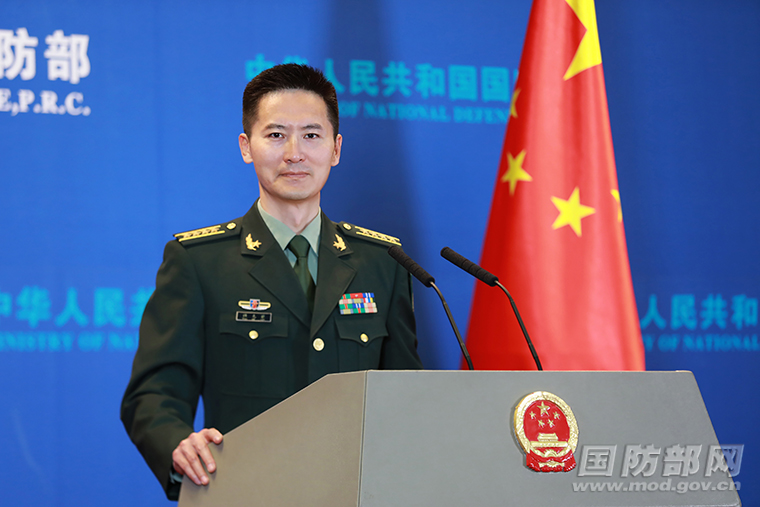
Question: State Councilor and Defense Minister General Wei Fenghe recently attended the China-Vietnam Border Defense Friendship Exchange and visited Kazakhstan, Turkmenistan, Iran, and Oman. Could you please give us more details on this?
Answer:As planned, State Councilor and Defense Minister General Wei Fenghe attended the 7th China-Vietnam Border Defense Friendship Exchange on April 23 and started his visits to Kazakhstan, Turkmenistan, Iran, and Oman since April 24 at the invitation of his foreign counterparts.
During the 7th China-Vietnam Border Defense Friendship Exchange, Minister Wei Fenghe met with his Vietnamese counterpart Minister Phan Van Giang. They planted friendship trees on the relevant port areas of the China-Vietnam border, added paint to a border monument and visited a local primary school and a friendship culture center in Vietnam. During his visits to Kazakhstan, Turkmenistan, Iran, and Oman, Minister Wei held talks with state and military leaders of the four countries and exchanged views with them on international and regional situations and state-to-state and mil-to-mil relations.
Question: It is reported that State Councilor and Defense Minister General Wei Fenghe held video talks with his Mozambican counterpart Cristóvão Artur Chume on April 19. Please give us more details about the talks. What is China's expectation for its military relationship with Mozambique?
Answer:State Councilor and Defense Minister General Wei Fenghe recently held talks with Mozambican Defense Minister Cristóvão Artur Chume via video link. They had friendly exchanges and in-depth discussions on mil-to-mil relations, anti-pandemic cooperation and international and regional situations. The two ministers reached consensus on many topics. China and Mozambique are good brothers and partners sharing weal and woe. In recent years, under the strategic leadership of the two heads of the state, the two militaries have deepened their relationship and carried out fruitful cooperation in personnel training, equipment and technology, military medicine and force development. Standing at a new historical starting point, the Chinese military stands ready to further consolidate the special friendship of “comrades and brothers” with the Mozambican side, deepen cooperation in various areas, and jointly grow a stronger mil-to-mil relationship.
Question: The US Department of Defense recently released its annual Freedom of Navigation (FON) Report for Fiscal Year 2021. It claims that during the period from October 2020 to September 2021, the US has operationally challenged 37 “excessive maritime claims” by 26 countries and regions, with China being the most involved, including five against the Chinese mainland and one against the Taiwan region. What’s your comment, please?
Answer:We’ve noticed the report. For many years, the US has, taking the so-called freedom of navigation as an excuse, dismissed other countries’ maritime rights and security concerns and frequently dispatched military vessels and warplanes to infringe upon other countries’ sovereignty and security and undermine regional peace and tranquility. China is firmly opposed to that and calls on relevant countries to jointly oppose such bullying behaviors at sea.
“Freedom of navigation” does not mean domineering and arbitrary trespassing. It should be conducted within the bounds set by the international law and the basic norms governing international relations, The sovereignty and security of coastal countries should be respected. These are self-evident principles. The US hasn’t even joined the United Nations Convention on the Law of the Sea (UNCLOS). Yet, it has been “enforcing the law” around the world with its powerful gunboats. It is an essential challenge to the international order based on international law, an ongoing threat to maritime navigation safety, and a catalyst to regional tensions. These behaviors are not worthy of releasing a report to flaunt itself. Instead, the US should do some serious self-reflection and take a long, hard look at how many collisions and casualties its obstinate and self-centered actions have caused.
We urge the US side to act like a responsible power, stop the so-called freedom of navigation operations, and stop releasing irresponsible reports like this one. Rather, it should truly respect other countries’ sovereignty, security and maritime rights and do more to contribute to regional peace and stability.
Question: At a recent meeting on biosafety and biosecurity held by the UN Security Council, Russia released documents about America’s engagement in bio-military activities in Ukraine and around the world, and accused the US side of violating the Biological Weapons Convention (BWC). Without directly responding to Russia’s accusation, the US instead questioned China and Russia’s implementation of BWC in its 2022 report on Adherence to and Compliance with Arms Control, Nonproliferation, and Disarmament Agreements and Commitments. What’s your comment on that?
Answer:Bioweapon is weapon of mass destruction. Recently, there were many exposures on America’s violations of the BWC and its engagement in bio-military activities. It has raised concerns and worries of the international community, including China. The US should give a clear answer on this kind of major security issues.
First, the US is a maker of bio-chemical crisis. There is evidence that the US military used bacterial weapons on the Korean Peninsula, including the China-DPRK border area, in the 1950s. It was publicly acknowledged even by some American historians. During the Vietnam War, the US military used “Agent Orange” in Vietnam, which caused irreversible damage to Vietnamese people and local environment. It is fair to say that the US is the only country on the planet that has used all kinds of weapons of mass destruction, including nuclear, chemical and biological weapons, against other countries.
Second, the US cannot hide from mounting questions on its bio-military activities. According to information released by the US side, it has 336 labs in 30 countries. A US under secretary of state said that there are US-run biological research facilities in Ukraine and the US should keep the research materials from falling into the hands of Russian troops. People of the world have the right to ask the US side some questions: What’s the relationship between the US Department of Defense and the US biolabs overseas? If US labs in Ukraine are only for scientific research, why is the US Department of Defense so deeply involved? Why have rare epidemics repeatedly broken out and spreaded in areas around these overseas biolabs owned by the US military? The US side must provide clear answers to these questions instead of hiding from them.
Third, China strictly follows the provisions of the BWC and calls for a comprehensive prohibition and thorough destruction of all kinds of weapons of mass destruction, including bioweapons. We oppose any country to develop, possess or use bioweapons under any circumstance. The US side made the so-called report on Adherence to and Compliance with Arms Control, Nonproliferation, and Disarmament Agreements and Commitments to lecture and point fingers at others. It is groundless and ridiculous. In reality, the US is the only country that has been opposing and blocking the establishment of a BWC verification mechanism. The US has set up biolabs and carried out bio-military activities around the world. Why is the US playing double standards on this issue? What is it trying to hide? This irresponsible attitude has aggravated international concerns over this issue.
Fourth, bio-military activities have a great bearing on international peace and security and matters on the security interests of each country. Once a victim of bioweapons, China solemnly asks the US side to act responsibly, take the international community’s concerns and doubts seriously, provide comprehensive and solid clarifications to its bio-military activities, and accept multilateral verification.
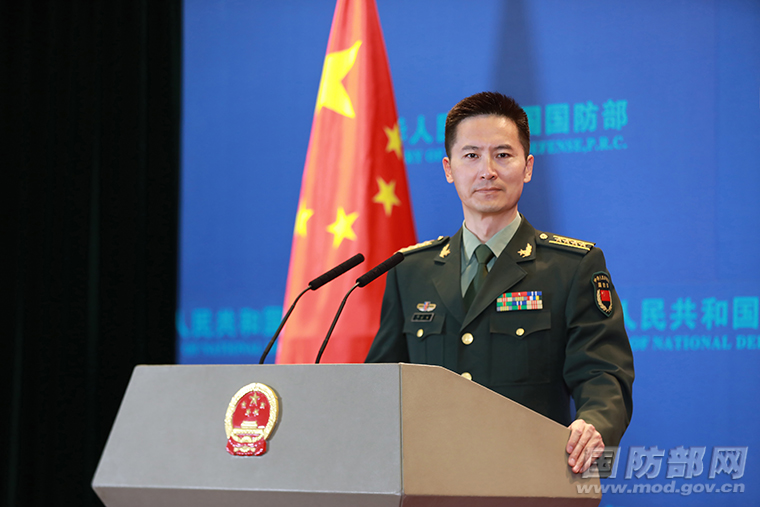
Question: According to the media, the US Defense Intelligence Agency recently released a report claiming that the Chinese military owns and operates about half of the world's ISR systems, which could support monitoring, tracking and targeting of the US and its allies. Also, chairman of the Space Development Committee of Japan's Liberal Democratic Party stated that in order to counter China's "space threat", the Japanese Self-Defense Force should establish a Space Operations Corps and increase the budget allocated to space-related defense. What’s your comment on this, please?
Answer:We have noted relevant reports. The US and Japan have ignored facts and fabricated and exaggerated the so-called "space threat" from China. Their objective is to create an excuse for their own space armament expansion and space domination. China is firmly opposed to such acts.
In fact, the US has promoted space militarization with a Cold War mentality in recent years. It has declared space to be a war domain, created the United States Space Command, established the space force, and aggressively developed and deployed directed energy, anti-satellite weapons (ASAT) and other offensive space weapons. It has also frequently held military exercises such as Schriever Wargame, Global Sentinel and Space Flag. As the country with most satellites, the US has intensively launched all kinds of satellites, including those for military reconnaissance. The US military is also a significant investor in commercial space industry. It has purchased commercial satellite services worth billions of dollars for military use. Meanwhile, the US has long been resisting space arms control. It has completely rejected the draft Treaty on the Prevention of the Placement of Weapons in Outer Space, the Threat or Use of Force Against Space Objects (PPWT) proposed by China and Russia for the reason of technical issues. It has also blocked the adoption of the Prevention of an Arms Race in Outer Space (PAROS) by the UN Group of Governmental Experts, making the relevant international efforts at a standstill. Japan is also speeding up the process of space military build-up and forming a space combat force. The aforementioned actions have increased the risk of weaponization and arms race in outer space and negatively affected global strategic stability. The international community should pay close attention to these moves.
Exploring the unknown cosmos and developing space technology is a common cause of mankind. April 24th this year marks the seventh Space Day of China. China sticks to peaceful utilization of space and stays committed to preventing space weaponization and arms race, and promoting international cooperation in space. For example, since the start of its manned space program, China has signed cooperation agreements and conducted diversified cooperation with multiple international space agencies, winning high praise from the United Nations Office for Outer Space Affairs. Not long ago, the astronauts of China’s Shenzhou XIII space ship conducted a "Tiangong Q&A" with American teenagers. They answered questions about astronauts' daily diet and life, and about how to observe the evolution of life in the space station.
China is willing to work with countries and regions that are committed to peaceful utilization of space to strengthen international cooperation, promote a community with a shared future for mankind in this area, and make a positive contribution to lasting peace and common security in space and the development of human civilization.
Question: According to reports, some Australian officials claimed that China's research and development of hypersonic missiles poses a threat to Australia and Australia will start new trilateral cooperation with the US and the UK on hypersonic, anti-hypersonic and electronic warfare capabilities. In view of the growing "threats" posed by Russia and China, Australia will accelerate its arms upgrade program. What’s your comment, please?
Answer:The US, the UK and Australia are cooperating in sensitive military areas such as nuclear-powered submarines and hypersonic missiles and trying to start and escalate confrontation in the Asia-Pacific. It has a huge impact on regional peace and stability. China is gravely concerned about this.
China is committed to a path of peaceful development and a national defense policy that is defensive in nature. Some people in Australia are scaring themselves by taking other countries' development as a security threat. Smearing others will not only harm regional security and stability but also jeopardize their own credibility.
We have noted that an Australian parliamentarian recently published an article saying that China poses no military threat to Australia and it’s the wrong actions of the current Australian government that have exacerbated bilateral tensions. We urge relevant people on the Australian side to correct their misperceptions and stop malicious hyping, so as to avoid further damage to the relations between the two countries and two militaries.
Question: According to reports, when discussing the defense budget for 2023, Japan's defense minister said that China's military development and activities have raised "strong concerns in the international community" and suggested that the “capability to attack enemy base” should be taken into considerations for the budget. Also, the Liberal Democratic Party of Japan proposed that China and Russia should be classified as security "challenges" together with the Democratic People's Republic of Korea in the new version of National Defense Program Guidelines, and that the defense budget should be further increased. What’s your comment on that, please?
Answer:Japan has recently made many excuses and spread irresponsible remarks to expand its military force and increase its defense expenditures, and seek the so-called “capability to attack enemy base”. Such dangerous attempts to break through its Exclusively Defense-Oriented Policy are what the international community should be vigilant of and concerned about.
In the past, Japanese militarists launched wars of aggression under the pretext of external threats, bringing great sufferings to the people of China and other countries in the region. We urge the Japanese side to take history as a lesson, be cautious with its words and deeds and do more for regional peace and stability.
Question: Australian Prime Minister Scott Morrison recently said that the security cooperation agreement between China and Solomon Islands had alerted Australia that there are long threats to its national security. Also, Australian media speculated that China might use its leased land to build a naval base. What’s your comment, please?
Answer:The report that China will build a naval base in the Solomon Islands is pure disinformation. Recently, some Australian officials and media have repeatedly hyped up the security cooperation between China and Solomon Islands, deliberately distorted facts and created tensions. It is extremely irresponsible and China is firmly opposed to it.
As two independent and sovereign countries, China and Solomon Islands, on the basis of equality and mutual benefit, carry out cooperation in maintaining social order, protecting the safety of people's lives and property, conducting humanitarian aid and tackling natural disasters. It will benefit the Solomon Islands' social stability and long-term peace and order, and serve the common interests of the South Pacific region. We urge relevant parties to stop hyping up "China military threat" and do more things for peace, stability and prosperity in the South Pacific region.
Question: According to reports, some US officials recently indicated publicly that they would steadfastly fulfill the commitment to safeguarding Taiwan, and "help Taiwan in the same way they support Ukraine" to improve Taiwan's self-defense capability. And according to Taiwan's "Ministry of National Defense", in response to the threat from the mainland, the Taiwan military would adopt the "combination of training and combat preparation" mode to verify its combat plan and battlefield construction, and carry out "Lian Hsiang exercise" to simulate the PLA's attack on Taiwan. What’s your comment on this, please?
Answer:The Taiwan question is different from the Ukraine issue in essence. The Taiwan question is China's internal affair and brooks no outside interference. Certain US officials recently made many wrong remarks on Taiwan. Some US senators visited Taiwan in an attempt to rally support for "Taiwan independence" separatists. This is severely inconsistent with the US commitment of not supporting "Taiwan independence" and demonstrates that the US has no credibility. China is firmly opposed to it.
The DPP authorities, out of their own political interests and in disregard of the safety and well-being of the Taiwan compatriots, have attempted to divide the country in collusion with external forces. This is an utterly wrong calculation. More and more Taiwan compatriots will see through the DPP authorities' lie of "relying on the US to seek independence", see the truth about the DPP authorities' betrayal to the ancestors and the motherland, and thus refuse to fall victim to the "Taiwan independence" separatists’ campaign of "seeking independence by force".
In response to the US officials' provocative visit to Taiwan, the PLA has recently conducted military operations in the seas and airspace of the Taiwan Strait. In the future, we will not appease provocation by the DPP authorities for seeking "independence" or interference by external forces, and we will continue to demonstrate firm resolve in safeguarding China’s national sovereignty and territorial integrity through solid actions.









